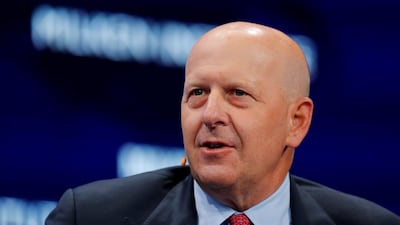Goldman Sachs chief executive David Solomon underscored the importance of cryptocurrencies as the US’ fifth largest bank posted record first quarter net profit and revenue on the strong performance of its investment banking and trading businesses.
The lender's net income rose an annual 464 per cent to $6.8 billion in the three months to March 31. Its revenue more than doubled to $17.7bn on an annualised basis, topping analysts' expectations of $12.6bn.
As activities in the areas of "cryptocurrency, blockchain and the digitisation of money" accelerate, there will be "significant disruption and change in the way money moves around the world", Mr Solomon said during the bank's earnings call.
“Many central banks are looking at digital currencies … working to apply this technology to their local markets and determine the longer term impact on global payment systems.”
“There is also significant focus on cryptocurrencies like Bitcoin, where the trajectory is less clear as market participants evaluate their possibility as a store of value,” he added.
As a bank, Goldman Sachs is looking for ways to expand its capabilities to support its clients’ crypto needs while operating “within the regulatory guidelines”, Mr Solomon said. Digital currencies are “important to the future of global financial systems,” he added.
His comments came the same day Coinbase, a trading platform for cryptocurrencies, went public on the Nasdaq. Its shares opened at $381 and rallied as high as $429.54, before dropping to close at $328.28, giving the crypto exchange a market cap of about $86bn.
In a virtual interview on Wednesday, the US Federal Reserve Chairman Jerome Powell compared cryptocurrencies to gold and said they are “vehicles for speculation”.
“They are really vehicles for speculation … they are not really being actively used as payments. For thousands of years, human beings have given gold a special value that it doesn’t have,” he said.
Goldman Sachs is reportedly working to offer its first investment vehicles for Bitcoin, the world’s biggest cryptocurrency, and other digital currencies to its private wealth management clients.
The bank restarted its cryptocurrency trading desk in February.
Last month, the world's biggest electric vehicle company Tesla started accepting Bitcoin as payment for its cars.
FinTech company PayPal is also offering its US customers an option to use digital currencies in their wallets to pay for purchases at online merchants.
During the January-March period, Goldman Sachs gained across all four of its major business units. Its investment banking arm generated record quarterly net revenues of $3.8bn, 73 per cent higher than the first quarter of last year. The global markets business added $7.6bn, almost 47 per cent more than the same period a year ago.
Asset management earned $4.6bn in three months, compared with only $96 million last year. Whereas, revenue in consumer and wealth management surged 16 per cent annually to $1.7bn.
“Our first quarter results underscore the ongoing strength … evidenced our successful execution towards the strategic priorities. We delivered the best performance in global markets in a decade,” Mr Solomon said.
“We maintained our leading global positions across M&A [mergers and acquisitions] and equity underwriting.”

Mr Solomon said the global economic recovery will depend on the progress around Covid-19.
He said while the roll out of vaccines is well underway in the US and the UK, the distribution has been challenged in a number of other countries.
“We remain vigilant to risks across markets. We are mindful of elevated valuation levels across certain asset classes, increased volatility in certain single name stocks and are aware of the inflationary risks.”


